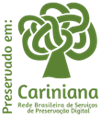Monitoreo de las convocatorias de investigación en ciencias de la información: una aproximación a las humanidades digitales
DOI:
https://doi.org/10.62758/re.v3i3.230Palabras clave:
Monitoreo de Convocatorias, Ciencias de la Información, Humanidades Digitales, Innovación en Contextos Digitales, Recuperación de InformaciónResumen
Este estudio se centra en el seguimiento de convocatorias de investigación en el campo de las Ciencias de la Información, con un enfoque en Humanidades Digitales. Este abordaje surgió como parte integrante del proyecto "Articulación y Comunicación en Ciencia y Tecnología (C&T): Subproyecto 01 - Investigación", vinculado al Instituto Brasileño de Información en Ciencia y Tecnología (Ibict), Ministerio de Ciencia, Tecnología e Innovación (MCTI), Brasil. El objetivo es desarrollar una herramienta para identificar tendencias y demandas emergentes en las convocatorias de propuestas vigentes en el país, con el fin de apoyar estudios y proyectos alineados con las necesidades de la sociedad brasileña. La metodología del estudio incluye la categorización de la información y el uso de hojas de cálculo para facilitar el seguimiento y el análisis de tendencias. Los resultados preliminares señalan la eficacia de este seguimiento para identificar prioridades como el análisis de big data, la preservación digital, la ética de la investigación digital y la colaboración interdisciplinaria. Las conclusiones preliminares también indican que la monitorización de las convocatorias de investigación proporciona información valiosa para la elaboración de propuestas y la búsqueda de financiación, promoviendo la colaboración entre disciplinas científicas y diferentes colectivos sociales. Las próximas etapas de la investigación incluyen la ampliación del alcance de las fuentes de búsqueda y la mejora de las estrategias de prospección. Además, se planea ofrecer un servicio de difusión de la información y desarrollar una aplicación móvil para mejorar la accesibilidad y usabilidad de los datos.
Citas
Ministério da Educação. (2023). e-MEC. https://emec.mec.gov.br/.
Pimenta, R. M. (2020). Por que humanidades digitais na ciência da informação? perspectivas pregressas e futuras de uma prática transdisciplinar comum. Informação & Sociedade: Estudos, 30 (2). DOI: 10.22478/ufpb.1809-4783.2020v30n2.52122. DOI: https://doi.org/10.22478/ufpb.1809-4783.2020v30n2.52122
Descargas
Publicado
Cómo citar
Número
Sección
Licencia
Derechos de autor 2023 Revista EDICIC

Esta obra está bajo una licencia internacional Creative Commons Atribución 4.0.
La Asociación posee los derechos de autor de los textos que publica y adopta la licencia Creative Commons, CC BY 4.0 DEED Atribución 4.0 Internacional (https://creativecommons.org/
Usted es libre de:
- Compartir: copiar y redistribuir el material en cualquier medio o formato para cualquier propósito, incluso comercialmente.
- Adaptar: remezclar, transformar y construir a partir del material para cualquier propósito, incluso comercialmente.






